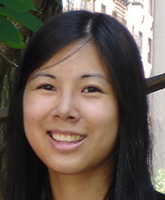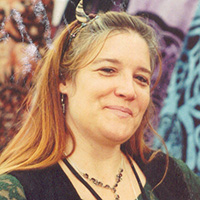Expanded remarks and an overview from Our 2017 Elgin Awards Chair, Josh Brown.
Poetry is back, baby.
You may have seen the article recently in Publishers Weekly, “Is Poetry the New Adult Coloring Book?” I’ll admit I cringed a little at the headline, which would seem to suggest that poetry is just another passing fad, a fleeting “in the moment” kind of thing, when it’s not. Speculative poetry is nothing new, either, take Beowulf, or Paradise Lost, for example.
So yes, it would seem that poetry is back, but then again, did it ever go anywhere? Hasn’t it been right here with us all along? Personally, it’s difficult for me to see this in broad strokes, mostly because my “day job” grants me the honor and privilege of working with some of the very best poetry presses in the world. But yes, when I see the immense popularity of a book like Night Sky with Exit Wounds by Ocean Vuong (his debut book, by the way) cross over into mainstream circles, it’s easy to see that the time for poetry to shine is right now. Combine this with the popularity of sci-fi and fantasy in in mainstream media (Marvel cinematic universe, anyone?), and there’s never been a better time for speculative poetry to take the spotlight.
And guess what? This year’s Elgin awards saw the largest number of nominated books of SFF poetry in the history of the award (since 2013), with 52 total nominees! It was great to be part of of the awards this year, and SFPA president Bryan Thao Worra has done an excellent job not only in promoting this year’s Elgins, but in promoting speculative poetry overall. The SFPA is lucky to have a president with such ambition, drive, and vision.
Named after SFPA founder Suzette Haden Elgin, awards are given in two categories: best chapbook and best full-length book.So without further ado, I present to you the winners of the 2017 Elgin Awards.

Full-Length Book Category
First: Field Guide to the End of the World • Jeannine Hall Gailey (Moon City Press, 2016)
Second (tie): A History of the Cetacean American Diaspora • Jenna Le (Anchor & Plume, 2016)
Second (tie): Small Spirits: Dark Dolls • Marge Simon (Midnight Town Media, 2016)
Third: Dead Starships • Wendy Rathbone (Eye Scry Publications, 2016)
Chapbook Category
First Place: Leviathan • Neil Aitken (Hyacinth Girl Press, 2016)
Second Place: Radio Heart, or; How Robots Fall Out of Love • Margaret Rhee (Finishing Line Press, 2016)
Third Place: Apocalypse • John C. Mannone (Alban Lake, 2015)

This year’s Elgin Awards had 21 nominees in the chapbook category and 31 nominees in the full-length category, the largest years since the awards were first established in 2013. The Science Fiction and Fantasy Poetry Association was established in 1978 and has an international membership representing over 19 nations and cultures including the United States, Italy, Canada, Brazil, United Kingdom, Ireland, Romania, Poland, Denmark, Germany, France, Spain, Israel, South Africa, Singapore, Thailand, Laos, the Hmong, South Korea, Australia, and New Zealand.
Jeannine Hall Gailey’s Field Guide to the End of the World, winner of the 2015 Moon City Poetry Award, has been said to deliver “a whimsical look at our culture’s obsession with apocalypse as well as a thoughtful reflection on our resources in the face of disasters both large and small, personal and public. Pop-culture characters—from Martha Stewart and Wile E. Coyote to zombie strippers and teen vampires—deliver humorous but insightful commentary on survival and resilience through poems that span imagined scenarios that are not entirely beyond the realm of possibility. The characters face their apocalypses in numerous ways, from strapping on rollerblades and swearing to taking notes as barns burn on the horizon. At the end of the world, the most valuable resource is human connection—someone holding our hands, reminding us “we are miraculous.”

Jeannine Hall Gailey recently served as the Poet Laureate of Redmond, Washington. She is the author of five books of poetry: Becoming the Villainess, She Returns to the Floating World, Unexplained Fevers, The Robot Scientist’s Daughter and, her latest, Field Guide to the End of the World. Her poems have been featured on NPR’s The Writer’s Almanac and on Verse Daily; two were included in 2007’s The Year’s Best Fantasy and Horror. She was awarded a 2007 and 2011 Dorothy Sargent Rosenberg Prize for Poetry and a 2007 Washington State Artist Trust GAP grant. Her poems have appeared in American Poetry Review, The Iowa Review, and Prairie Schooner. Visit her online at: http://webbish6.com/
A History of the Cetacean American Diaspora by Jenna Lê begins with the premise that “49 million years ago, the ancestors of modern whales left their terrestrial habitat to embrace the unknown perils of an oceanic existence.” In this poetry collection, Jenna Le reflects with wit and lyricism on the ways that land and sea creatures alike are defined by their predecessors’ immigrant narratives. In doing so she writes from a wide variety of perspectives including her own as a second-generation Asian-American, daughter of Vietnam War refugees, and physician in the melting pot of the Bronx. Here is a book of verse steeped in the aromas of sea salt and ambergris, blood and antiseptic, love and death.”

Born in Minnesota, Jenna Lê earned her B.A. in mathematics before obtaining her M.D. She lives and works as a physician and educator in the Upper Valley region of New Hampshire. She is also the author of Six Rivers (NYQ Books, 2011). Her poetry has appeared in AGNI Online, The Best of the Raintown Review, Bellevue Literary Review, Denver Quarterly, The Los Angeles Review, and Massachusetts Review. Her website is jennalewriting.com.
Small Spirits: Dark Dolls by Marge Simon is another of the poems-for-art duets by Bram Stoker® Award winning poet Marge Simon and artist Sandy DeLuca. These unusual poems involve dolls of many sorts, including legends from countries all over the world. Readers will find small spirits of the wicked, the damned and the beloved. Be prepared for the mystical, magical and often misanthropic dolls in this colorful collection.

Marge Simon freelances as a writer-poet-illustrator for genre and mainstream publications such as Nebula Awards 32, Strange Horizons, Flashquake, Flash Me Magazine, Dreams & Nightmares, The Pedestal Magazine, and Vestal Review. Marge Simon is a former president of the Science Fiction and Fantasy Poetry Association and an SFPA Grand Master of Speculative Poetry. She edits the column “Blood and Spades: Poets of the Dark Side” for the monthly newsletter of the Horror Writers Association Marge’s poetry has received the Bram Stoker Award, the Rhysling Award, the Dwarf Stars Award, and the Strange Horizons Readers Award. She has also illustrated five Bram Stoker Award collections. In addition to her solo work, Marge has written and published collaboratively with many other authors, including Bruce Boston, Charlee Jacob, Mary Turzillo, and Malcolm Deeley. You can see her work online at margesimon.com
Sandy DeLuca is an American novelist, poet and painter. She was born in Providence, RI, and has lived in New England all her life. She was a finalist for the BRAM STOKER for poetry award in 2000 (Burial Plot in Sagittarius), and again in 2013 for Dangerous Dreams, with Marge Simon. Her illustrations accompany notable poetry collections and she has painted cover art for popular genre magazines. Her original paintings have been exhibited in Rhode Island, Massachusetts and New York’s Hudson Valley. She left the corporate world in 2011, and she now divides her time between writing and painting. For more information about her work visit her at: SandyDeLuca.com
The poems in Dead Starships originate from the endless muse that resides within us all and travels outward. Here readers will find lost starship captains, alien princes, timeless androids, the sorrow, the longing, the nostalgia and the ecstasy of moving beyond the Earth and into the unknown. Several of the poems in this collection were previously published in places like Asimov’s, Dreams and Nightmares, and Star*Line. One of them took second place in the 2017 Rhysling Awards.

Wendy Rathbone said “Thank you to the members of the SFPA for giving me third place.” She spoke about her process: “I have what I call my “night notebooks” and most of my poetry is written in them, long-hand, while I am in bed just before sleep. I focus more on beauty of language at first, less on meaning. Meaning comes because I trust my muse. Because I have a love for science fiction and fantasy, such images tend to make their way into my work at will.” She talks about writing and does mini-interviews with other authors at her blog, “From the Left Dimension” Visit her at http://wendyrathbone.blogspot.com/
Neil Aitken’s Leviathan is a collection of poems inspired by and examining the life of Charles Babbage and other figures in the early age of computing.
Neil Aitken is the author of two books of poetry The Lost Country of Sight (Anhinga, 2008), winner of the 2007 Philip Levine Prize, and Babbage’s Dream (Sundress, 2017), semi-finalist for the Anthony Hecht Prize. He is the founding editor of Boxcar Poetry Review and also runs the online resource sites Chapbook Review and Have Book, Will Travel.

Of Chinese, Scottish, and English descent, he was born in Vancouver, BC and raised in Saudi Arabia, Taiwan, and the western United States and Canada. His poems have appeared in American Literary Review, Crab Orchard Review, Ninth Letter, and elsewhere. A former computer games programmer, he has received fellowships from Kundiman and Idyllwild and holds both an MFA in Creative Writing from UC Riverside and a PhD in Literature & Creative Writing from the University of Southern California. In collaboration with Chinese poet-translator Ming Di, he translated The Book of Cranes: Selected Poems of Zang Di (Vagabond 2015) as well as, Ming Di’s own first selected poems, River Merchant’s Wife. His co-translations of Jiang Hao, Jiang Li, Jiang Tao, Lü De’an, Lü Yue, Sun Wenbo, and Zang Di are also prominently featured in New Cathay: Contemporary Chinese Poetry, 1990-2012 (Tupelo 2013). He was awarded the 2011 DJS Translation Prize for his translations of contemporary Chinese poetry.
Poet Joseph O. Legaspi described Margaret Rhee’s Radio Heart, or; How Robots Fall Out of Love by saying “Part science fiction, all love poems, Radio Heart; or How Robots Fall Out of Love adeptly illustrates and examines our millennial desires, in turn, our deep-seated and engineered loneliness. The collection is an acrobatic, careful amalgam of lyricism and algorithms, intelligence and kitsch, which manages scientific seriousness while winking, without sacrificing raw emotions (see: robot death scene). What a fun, sexy read, sprinkled with double entendre, yet layered with genuine feelings and cerebral warmth! It takes a poet with a sharp emanating mind and a huge blaring heart to assemble such poems for the next decades now.”

Margaret Rhee is a poet, artist, and scholar. She is also the author of chapbooks Yellow (Tinfish Press, 2011), and her forthcoming full-length collection, Love, Robot (The Operating System, 2017). Her project The Kimchi Poetry Machine was selected for the Electronic Literature Collection Volume 3. She edits “Machine Dreams Zine,” a free collection of creative and critical work on machines, arts, and difference. As a scholar, she is at work completing her first monograph, “How We Became Human: Race, Robots, and the Asian American Body. She received her Ph.D. from UC Berkeley in ethnic and new media studies. Currently, she is a Visiting Scholar at the NYU A/P/A Institute, and a Visiting Assistant Professor at SUNY Buffalo in the Department of Media Study.
John C. Mannone’s Apocalypse is a poignant collection that “begins with the end of our world, giving birth to a haunting symphony of ways to devastate a planet. Each poem invokes a different hymn, images that may or may not be Earth, intertwined with an underlying beat of love, that simple emotion that survives even the end of all things.”

John C. Mannone has work in Panoply, Blue Fifth Review, New England Journal of Medicine, Peacock Journal, Gyroscope Review, Inscape Literary Journal, Baltimore Review, Pedestal, Still: The Journal, Pine Mountain Sand & Gravel, Pirene’s Fountain and hundreds others. He’s been awarded Weymouth writing residencies and has three poetry collections: Apocalypse (Alban Lake Publishing, July 2015); Disabled Monsters (The Linnet’s Wings Press, December 2015) featured at the 2016 Southern Festival of Books; and Flux Lines (Celtic Cat Publishing, Summer 2017), a collection of love-found/love-lost poems using science metaphors. He has won the Tennessee Mountain Writers poetry (2015) and creative nonfiction awards (2015 and 2017) and nominated for several Pushcart and Rhysling awards. He edits poetry for Abyss & Apex and other venues. He’s a professor of physics living near Knoxville, TN. Visit http://jcmannone.wordpress.com
Reblogged this on Ninja Mind Control.
LikeLike